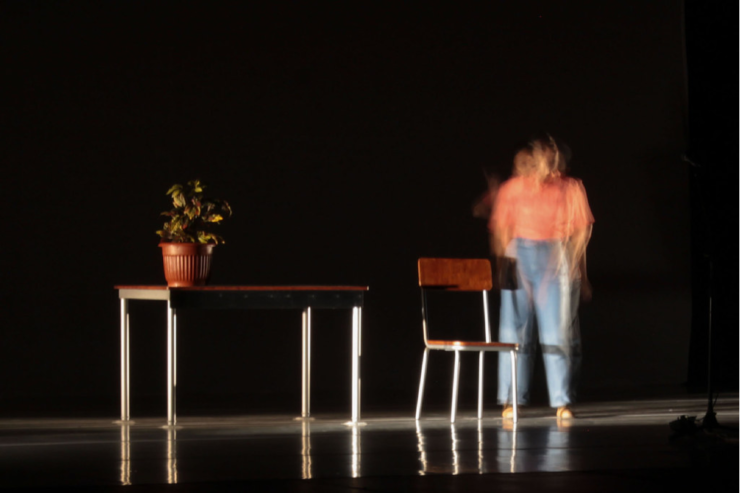Seminar Blogs
“”Always Outwards”: A Radical Dramaturgy Beyond Verbal Boundaries” – Eleonora Stacchiotti
The last Transmission in Motion session included an inspiring conversation with Chilean theatre director, scriptwriter and musician Manuela Infante. Manuela has introduced us to her ongoing attempts to decolonize the theatrical space from anthropocentric practices through dramaturgies that are based on natural elements. In some sort of biomimicry-like compositions, she translates posthuman theoretical and philosophical works into theatre pieces. Estado Vegetal, drawing on plant neurobiology and plant philosophy, is a quiet-but-still subversive endeavor to politicize vegetal life, which becomes in this way the model of a new reconfiguration of human beings on the stage of the world. As a matter of fact, Infante envisions theatre as a laboratory “to make ideas become embodied”, a space where one can enact experiments in thinking and in becoming with the multitudes of objects that crowd the stage. Grounding herself on Michael Marder’s idea that “to recognize a valid ‘other’ in plants is also the beginning to recognize that vegetal other within us” (Marder 2013, as cited by Manuela Infante during the talk at TiM), Manuela Infante is suggesting that the first step to start proper decolonization of space and time has to be found within ourselves. Although proposing a return to our inner life, plant philosophy expands and cut distances among different kinds of life on planet Earth. However, if we keep expanding the notions of subjectivity and agency within the realm of representational language – that is to say without modifying the modality through which we approach the natural, word-less element – the structure of privilege is still in place and the non-human entity in itself has nothing more than a humanized, fetishized mean of expression that depends on human interpretation. In most cases, the spoken and written have a greater role in the Western tradition of storytelling and I find this very problematic.

On the contrary, Infante fully recognized the limitations of human language and understanding for the decolonization process. As highlighted during the seminar, Manuela chose theatre to carry on with her research since, unlike other environments, the performative space allows things to be left unsaid, undiscovered and untold to human knowledge. In Estado Vegetal, she picked rhythm as the main unity of her dramaturgy: the script and the story have been created in a collaboration between the main actress and a loop machine, so that the show is not driven by the importance of the spoken word but is the result of a combination of diverse (human and non-human) voices. Moreover, she put on stage half a dozen human characters that are interpreted by the same actress, who, in this way, remixes and reformulates the notion of the self as solid and made of inseparable parts. Even if the theatre piece makes use of spoken word to tell a story to the audience, words result to be just a medium for one of the elements making up the performance. Plants mode of existence is rendered through a series of dramaturgical choices – such as light design, the fact that every scene is “modular and self-contained” (Infante 2020), the centrality of rhythm and of the loop machine – and the human direct understanding of it is not Infante’s first concern, as confirmed by herself during the talk.
In the last part of her Estado Vegetal, when the only human protagonist reflects on the condition of being in the vegetative state, she pronounces this sentence:
to be, to grow, always outwards
so that, that thing called I is only the memory
of a seed.
To be one-self is just a seasonal event
Here, the protagonist juxtaposes the “absurd hierarchy of animal democracy” to the “noble vegetal dispersion” and the “marvelous democratic branches” (Infante 2017), in a movement that reassesses the value of planthood on the animal being. To work towards radical decolonization, it is necessary to decolonize ourselves from the very notion of the I, which is nothing more than the embryonic status of an ongoing process of growth and encounter with a borderless, often incomprehensible “other”.
References:
- Infante, Manuela. 2017. Estado Vegetal, Santiago de Chile.
- Marder, Michael. 2013. Plant-thinking: A Philosophy of Vegetal Life. New York: Columbia University Press.
*Image credits: “MX AC ESTADO VEGETAL” by Secretaría de Cultura CDMX is licensed with CC BY 2.0. To view a copy of this license, visit https://creativecommons.org/licenses/by/2.0/

